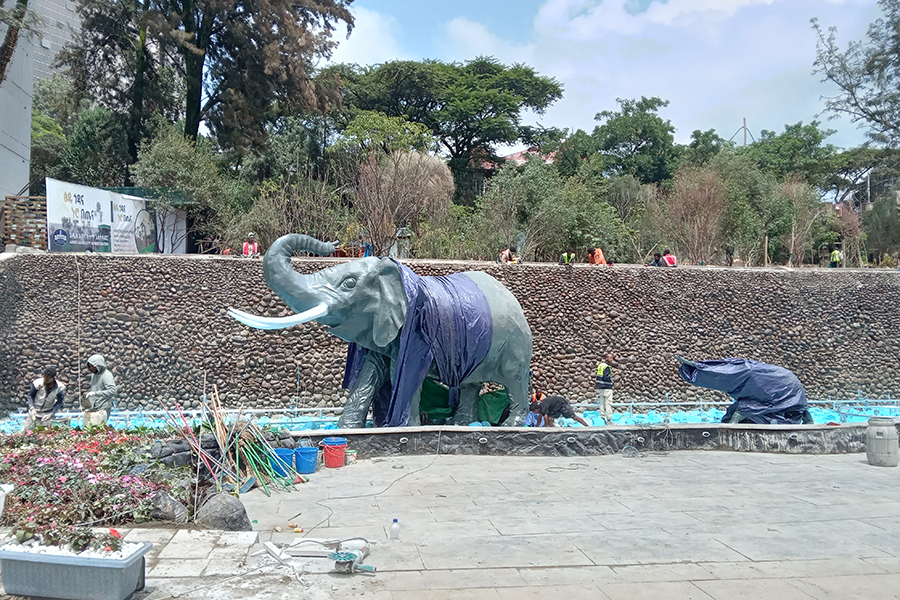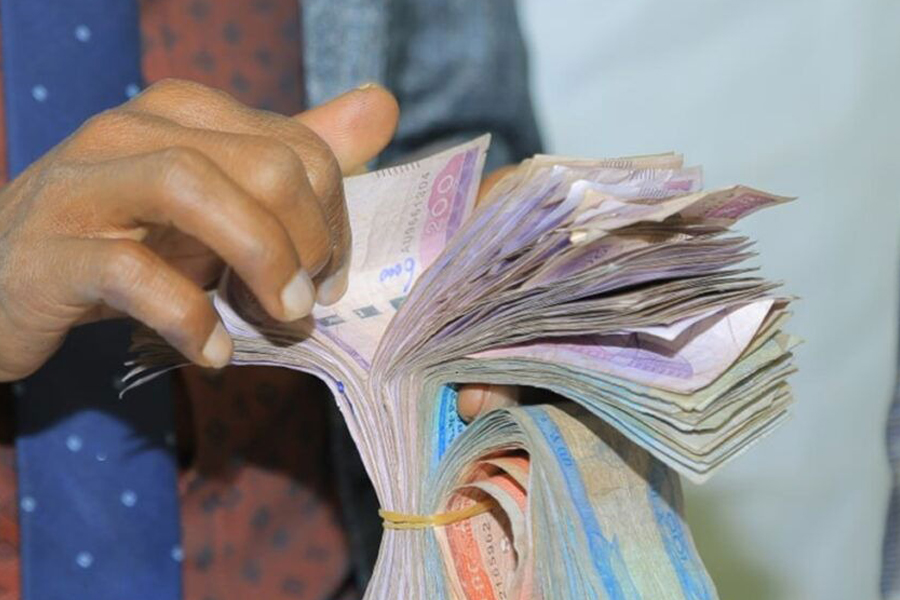
Fortune News | Nov 24,2024
In a move that has sparked outcry and apprehension, Petroleum & Energy Authority officials have suspended operations of 40 gas stations in Addis Abeba and the surrounding Sheger cities. The decision, blaming the station operators’ failure to comply with a state-mandated digital payment system, has thrust the fuel retail market and its regulatory practices into the spotlight.
The suspension, which affects shipments from Djibouti, threatens to precipitate a significant petroleum shortage across the city and peripheral towns. The directive, issued by Saharla Abdullahi, director general of the Authority, comes after an audit that found over half of the transactions at these outlets were processed outside of Telebirr, a mobile money service operated by state-owned Ethio telecom. The crackdown, including warnings to 57 other stations, marks a rigorous enforcement of the digital payment system launched in April. It followed a month-long audit of 225 gas stations, using transaction data from Telebirr.
However, the suspension has been met with outrage from gas station owners, who argue that the Authority failed to conduct a proper auditing. Prominent brands such as National Oil Ethiopia (NOC), OLA Energies, and TotalEnergies are among those affected, raising concerns about the broader impact on the fuel retail industry.
The fuel retail sector has witnessed significant growth in recent years, with the number of operating companies increasing from nine to 49 and the number of fuel stations rising from 682 to 1,590. National Oil Ethiopia (NOC) holds the largest market share at 35pc, followed by multinational companies such as OiLibya and Total Ethiopia, with respective shares of 22pc and 23pc. Other companies, like Yetebaberut Beherawi Petroleum, TAF Oil, Kobil Ethiopia, and Dalol Oil, collectively hold around 11pc of the market.
Yet, despite its growth, the market trails neighbouring countries like Kenya in the number of fuel stations, a disparity partly attributed to smaller profit margins.
The Ethiopian Petroleum Supply Enterprise (EPSE) disclosed that over four billion dollars is required to procure gas for a year, covering 4.3 million tonnes of various types of gas. Procurement of these petroleum products is conducted through the federal government, such as the import of 60pc of white diesel and 100pc of aircraft petroleum from Kuwait. International tenders are often issued to buy benzene following disruptions in the previous supply from Sudan.
In the fiscal year 2020/21, the cost of Ethiopia’s petroleum imports saw a significant increase of nearly 19pc compared to the previous year, reaching an all-time high of 72.60 billion Br. This increase in cost is attributed to the higher international oil prices despite a 3.8pc decline in the total volume of imported petroleum. This decrease in volume was mainly due to a drop in the import volume of jet fuel and gas oil, offset by an increase in the import of regular gasoline and fuel oil.
The country has faced challenges, including increased costs due to higher international oil prices and logistical issues affecting the distribution sector. Smuggling to neighbouring countries from towns bordering them has been a major headache to the authorities who were pushed to make digital payment at gas stations mandatory.
The suspension has exposed a critical gap in implementing a uniform digital transaction system within a diverse financial landscape.
Ephrem Tesfaye, a board member of the Ethiopian Petroleum Dealer’s Association and a NOC gas station retailer, raised concerns about discrepancies in the data used by the Authority and the data held by the dealers. The discrepancy, he argued, could lead to critical shortages at his and other outlets.
“There is a data error,” he told Fortune.
He claimed that there is close to a 45 million Br difference between the data at the hands of the Authority and his dealership, with the suspension causing the 400,000ltr a week his outlet needs to be out of reach.
“We'll go dry in a few days,” he said.
Deriesa Kotu, head of petroleum dissemination and regulation at the Authority, requested further clarifications from Telebirr executives about the transaction data. While acknowledging the need for scrutiny, Deriesa disclosed integrating the Authority’s system with various digital payment platforms, not just Telebirr. According to him, the integration aimed to enhance traceability in the fuel supply chain, a measure incrementally expanded by the Authority throughout the year.
Critics, including the 500-strong Ethiopian Petroleum Dealer’s Association, have noted the oversight in disregarding other payment methods, such as the Nedaj App, which is integrated with the Commercial Bank of Ethiopia (CBE).
The situation becomes more complex with the differing perspectives of industry players.
Biruk Adera, chief mobile officer of Telebirr, acknowledged gaps between the transactions reported by the stations and the Authority’s audit findings. While accepting the predominance of Telebirr transactions, which recorded 123 billion Br, he urged other payment systems to be included in the auditing process.
“We can’t claim to know how they audit,” he told Fortune.
He disclosed that an email had been sent by Telebirr to the Director General on 11, 2023, to delay the ban and review the data further as there was evidence of disparity after several rounds of cross-checks.
Frustrated retailers, like Daniel Geremew, are contemplating legal action if the ban is not lifted soon. Daniel, whose station operates under the TotalEnergies brand, expressed disbelief at the lack of consideration for price fluctuations and the absence of prior discussions before the suspension. He insisted that all transactions at his station in the Asko area were processed digitally through all available channels.
Daniel was shocked to learn that his gas station around the Sebara Babur area, which has daily transactions close to a million Birr under the TotalEnergies logo, was among the list of suspended outlets.
Deriesa was convinced that all gas stations had been selling with cash. Four days after the ban, the Authority had asked Telebirr executives for further clarifications on the transaction data from September 21 to October 22 after 11 gas stations filed complaints.
“We’re mindful of fuel shortages in not banning all of them,” he told Fortune.
Industry veterans like Tadesse Haile Mariam, former head of the Ethiopian Petroleum Supply Enterprise, view the auditing process as essential for addressing smuggling and theft. However, he also noted the potential for discrepancies due to the vast amount of data and challenges in its accurate compilation. According to Tadesse, adequately collecting data from multiple transaction channels is important to effectively manage the evolving fuel supply chain.
“The system is meant to track down illegal actors,” he told Fortune.
PUBLISHED ON
[ VOL
, NO
]

Fortune News | Nov 24,2024

Radar | Jun 22,2024

In-Picture | Jul 28,2024

Fortune News | Apr 03,2023

Agenda | Aug 04,2024

My Opinion | Oct 05,2024

Radar | May 07,2022

Fortune News | Sep 03,2022

Fortune News | Jul 13,2024

Featured | Sep 13,2022

Dec 22 , 2024 . By TIZITA SHEWAFERAW
Charged with transforming colossal state-owned enterprises into modern and competitiv...

Aug 18 , 2024 . By AKSAH ITALO
Although predictable Yonas Zerihun's job in the ride-hailing service is not immune to...

Jul 28 , 2024 . By TIZITA SHEWAFERAW
Unhabitual, perhaps too many, Samuel Gebreyohannes, 38, used to occasionally enjoy a couple of beers at breakfast. However, he recently swit...

Jul 13 , 2024 . By AKSAH ITALO
Investors who rely on tractors, trucks, and field vehicles for commuting, transporting commodities, and f...

Nov 1 , 2025
The National Bank of Ethiopia (NBE) issued a statement two weeks ago that appeared to...

Oct 25 , 2025
The regulatory machinery is on overdrive. In only two years, no fewer than 35 new pro...

Oct 18 , 2025
The political establishment, notably the ruling party and its top brass, has become p...

Oct 11 , 2025
Ladislas Farago, a roving Associated Press (AP) correspondent, arrived in Ethiopia in...